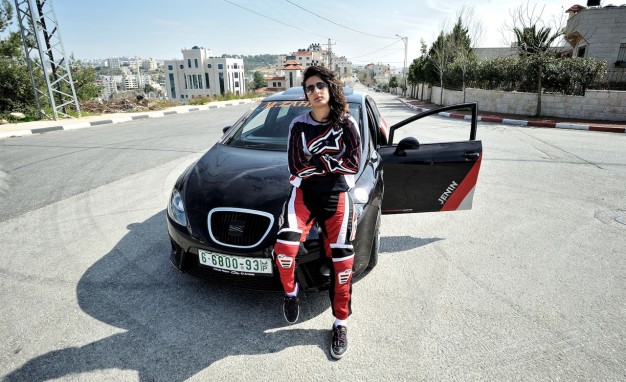|
One hardly expects a story of political struggle to feature a team of intemperate young women racing their cars around a dusty, fenced-in track. But in a Palestinian context, everything is political. Even if the new film Speed Sisters doesn’t chronicle an explicit struggle, it’s a portrait of a people whose determination will remind Israelis that resistance to their occupation is not moribund.
My January review of Ghada Karmi’s memoir Return, points to inexorable expressions of what it means to be Palestinian, how memories ofPalestine are inexhaustible. Surely a half century of pursuits by writers, journalists, artists, lawyers, and three generations of boys-with-stones testify to the compelling Palestinian narrative, propelled by the unquenchable energy of these people and the virtue of their mission.
 Some stories are tragic, some heroic (and at the same time tragic), some little more than nostalgia, and others simply facts-on-the-ground. Some, like Return, are forlorn and, grudgingly, sadly honest. Some stories are tragic, some heroic (and at the same time tragic), some little more than nostalgia, and others simply facts-on-the-ground. Some, like Return, are forlorn and, grudgingly, sadly honest.
Filmmaking too documents the unfolding, always unfolding, story of Palestine. There was The Wanted 18, Amer Shomali’s 2014 animated Palestinian film told from the viewpoint of dairy cows deemed a threat to Israeli security. Elia Suleiman’s productions (Chronicle of a Disappearance, Divine Intervention, The Time That Remains) are augmented by Nida Sinnokrot’s documentary Palestine Blues, focusing on the destiny of a farm tractor. Mai Masri, director of nine films, continues a distinguished career with a new production, “3000 Nights”, now opening in several US cities.
Veteran filmmaker Masri is joined by a notable new generation of mainly women, among them Palestinians Annemarie Jacir (Salt of the Sea), and Cherien Dabis (Amreeka). Canadians Ruba Nadda (Cairo Time) , and Nadine Labaki (Caramel and Where Do We Go Now? ) are well established feature filmmakers. Among newcomers are Rola Nashef (Detroit Unleaded) and Amber Fares, director of Speed Sisters opening inNew York this month. A new twist on the Palestinian experience, these ‘speed sisters’ are four feisty women and their team captain. They’re race car drivers spinning and screeching their vehicles through courses inBethlehem,Jericho, and their hometown Ramallah. In sync with these women, the film is a fast-paced, raucous adventure that follows their pride, their energy and their drive to win.

Fares sets her camera sometimes from within the women’s vehicles, sometimes in the middle of the dusty course as the racer spins and roars around her, sometimes in her home, sometimes among youths cheering her on from the bleachers, all this within sight of ubiquitous Israeli troops. (All spaces here are militarily occupied.)
Car racing started in Palestine in 2005 and women joined the sport hardly a year later. One can’t help admiring these women. Each snaps on her helmet and grits her teeth, jaws set firmly on victory even against competing teammates. We have the firm impression that each knows what she’s doing and knows what she wants. Director Fares interweaves raucous racing scenes into the women’s encounters with military occupation—passing through checkpoints en route toJerusalem, slipping away for a day at the beach near Tel Aviv, courting a tear gas attack when they playfully approach an Israeli patrol.
If we as viewers remove ourselves from the excitement of the chase and the energy of each racer’s personality, we might ask: where could this thrilling hobby possibly lead, for the individual women, and for Palestinian political aspirations?
On her drive to Al-Aqsa Mosque in Jerusalem to pray, team captain Maysoon is assaulted by young boys selling balloons. In the moments when the camera catches their stubborn exchange with Maysoon, we can feel the boldness of those boys, the same resolve that infuses these women racers. Their life is really tough, and they won’t give up. You don’t want to mess with this crowd.
Barbara Nimri Aziz, a New York-based anthropologist and writer, hosted RadioTahrir on Pacifica-WBAI in New York City for 24 years. Her 2007 book Swimming Up the Tigris: Real Life Encounters with Iraq is based on her 13 years covering Iraq. Aziz’ writings and radio productions can be accessed at www.RadioTahrir.org.
|